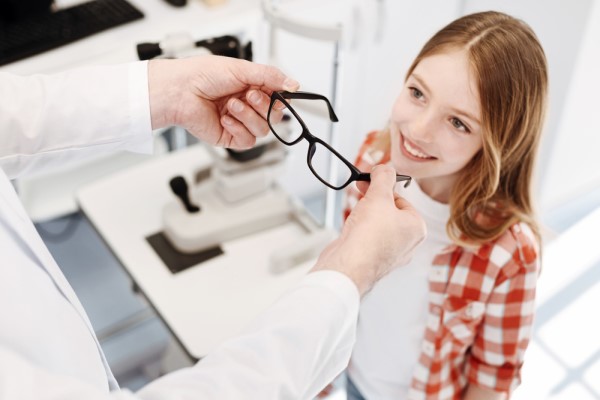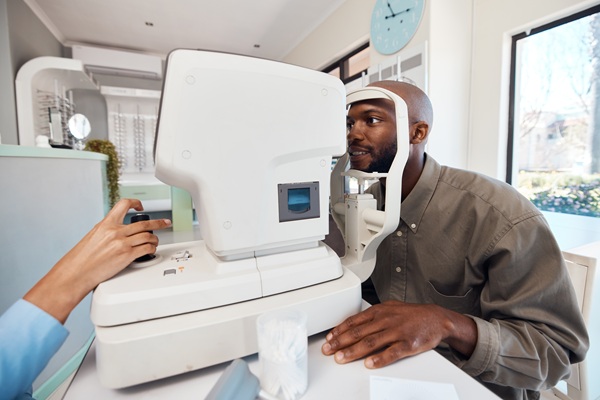Differences Between Corrective Lenses and Eyeglasses

Corrective lenses and eyeglasses are effective tools to address nearsightedness, farsightedness, and other eye conditions for the long term. However, there are notable differences between corrective (contact) lenses and eyeglasses. This review discusses corrective lenses and eyeglasses, highlighting how they are defined, the benefits and drawbacks of each, and how to choose between these two popular treatment options.
What are corrective lenses?
Corrective lenses are worn in front of the eyes to help improve the patient’s vision. The most notable type of corrective lenses are contact lenses, which are worn on the corneas of the eyes. They are used to address a range of vision problems, including but not limited to:
- Myopia (nearsightedness)
- Hyperopia (farsightedness)
- Astigmatism
- Presbyopia
There are different types of corrective contact lenses, including corrective, cosmetic, soft, hard, and therapeutic lenses. The type that the eye doctor recommends depends mainly on the vision condition that is being addressed and the patient’s personal preference.
The pros and cons of corrective lenses
Corrective lenses are effective at correcting the patient’s vision so they can see properly, reducing the risk of costly mistakes such as car accidents. One of the primary reasons that many patients choose corrective lenses instead of eyeglasses is the discreet appearance that they provide, as most corrective lenses are not noticeable while they are being worn, whereas glasses are highly visible.
However, many patients find it more challenging and inconvenient to wear corrective lenses, and there is a chance that they could fall out at an inopportune time. While corrective lenses are less expensive than eyeglasses up front, replacements and cleaning supplies are ongoing expenses, and the costs can add up over the years.
The prescription process for corrective lenses
The prescription process for corrective lenses is different than the process for eyeglasses. An optometrist can determine the proper prescription for corrective lenses during a comprehensive eye examination. However, the curvature and width of the eye must be measured for corrective lenses. The patient and the eye doctor must also determine the best type of corrective lenses; most patients opt for soft contact lenses.
What are eyeglasses?
Eyeglasses, also called spectacles, contain corrective lenses held within frames. They can address all the same vision complications that corrective lenses can address, including myopia, hyperopia, astigmatism, and presbyopia. Prescription eyeglasses are personalized to meet the patient’s vision needs.
The pros and cons of eyeglasses
Eyeglasses are just as effective as corrective lenses. Many patients also find it more convenient to wear eyeglasses than corrective lenses. It can take time to properly place corrective lenses, and there is always a risk of them coming loose or falling out at an inopportune time and needing to be replaced. While eyeglasses are vulnerable to breaking, they are far more reliable for many patients.
Eyeglasses, however, are more expensive than contact lenses up front, and the patient must properly care for them to ensure that they are not lost or damaged. Replacing eyeglasses can take time. Also, some prefer how they look with glasses, but others may dislike their appearance while wearing them.
The prescription process for eyeglasses
The prescription for eyeglasses can be determined with a comprehensive eye exam. Since eyeglasses sit away from the eyes, rather than on the corneas, as is the case with corrective contact lenses, there is no need to measure the width and shape of the eyes. Instead, after receiving their prescription, the patient can simply choose their favorite frame design and style of glasses. Once the prescription lenses are added to the frame, the eye doctor will call the patient in to receive their glasses.
How do I determine whether corrective lenses or eyeglasses are right for me?
Both corrective lenses and eyeglasses are effective at correcting most vision complications, so in many cases, the choice between corrective lenses or eyeglasses comes down to personal preference. Patients should consider their lifestyle and how they feel about the appearance of eyeglasses when deciding which option is more appropriate for them. In certain circumstances, such as when treating keratoconus (an eye disease), hard contact lenses may be recommended to try to improve natural vision and decrease dependence on eyewear.
Are you considering corrective lenses or eyeglasses?
If you are having trouble with your vision or have been diagnosed with a vision condition and want to learn more about your available treatment options, contact our optometrist today. We can help with diagnostics (if necessary) and explain the pros and cons of all treatment solutions in greater detail, so you can make the most informed decision based on your treatment goals and preferences.
Get more information here: https://www.texasoptical.net or call Texas Optical at (214) 771-7333
Check out what others are saying about our services on Yelp: Read our Yelp reviews.
Recent Posts
Contact lens exams are fundamental to maintaining clear vision and promoting overall eye health. Many individuals rely on contact lenses for daily activities, sports, and social events, yet consistent monitoring of lens fit and eye condition often receives less attention than it deserves. An optometrist specializing in evaluating the cornea, tear film, and general ocular…
Red, irritated eyes can result from something as simple as fatigue or dryness. However, persistent or severe symptoms may indicate a more serious condition requiring red eye treatment from an optometrist. Understanding when those everyday symptoms become something more serious is key to protecting long-term vision and avoiding complications. Catching the signs early on and…
Vision health is an important part of your everyday life. When urgent and unexpected issues arise, you must seek emergency eye care from an optometrist. Whether the issue results from trauma, infection, or sudden changes, immediate attention from an optometrist can prevent complications and preserve your long-term ocular health.Individuals may need emergency eye care for…
A myopia optometrist can help manage and slow the progression of nearsightedness, especially in children and young adults. Nearsightedness, or myopia, causes distant objects to appear blurry while close-up vision remains clear. Without proper care, myopia can worsen over time, leading to higher prescriptions and an increased risk of eye health problems.Myopia occurs when the…


